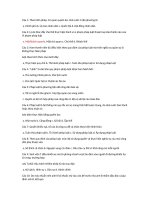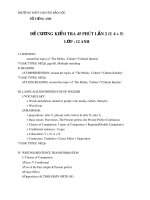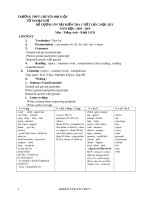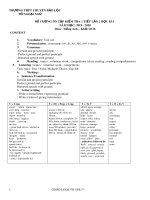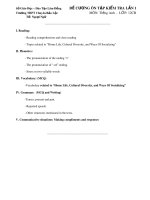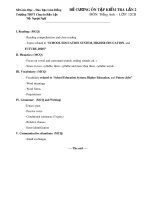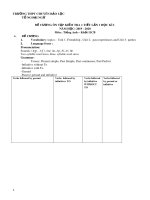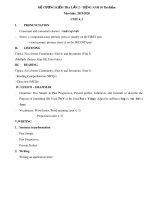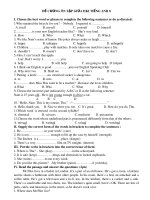Đề cương ôn tập kiểm tra lần 1 môn Tiếng Anh 11 năm 2019-2020 - Trường THPT chuyên Bảo Lộc
Bạn đang xem bản rút gọn của tài liệu. Xem và tải ngay bản đầy đủ của tài liệu tại đây (432.57 KB, 7 trang )
TRƯỜNG THPT CHUYÊN BẢO LỘC
TỔ NGOẠI NGỮ
A.
ĐỀ CƯƠNG ÔN TẬP KIỂM TRA 1 TIẾT LẦN 1 HỌC KÌ I
NĂM HỌC: 2019 2020
Môn : Tiếng Anh – Khối 11CB
ĐỀ CƯƠNG
1.
Vocabulary: topics : Unit 1 Friendship , Unit 2 past experiences and Unit 3 parties
2.
Language focus :
Pronunciation:
Sounds: / dʒ/ , /t ʃ /, /m/, /n/, /η/, /l/, /r/, /h/
Twosyllable word stress, three syllable word stress
Grammar :
Tenses: Present simple, Past Simple, Past continuous, Past Perfect
Infinitive without To
Infinitive with To
Gerund
Passive gerund and infinitive
Verbs followed by gerund
1
Verbs followed by
infinitive+ TO
Verbs followed Verbs followed
by infinitive
by gerund or
WITHOUT
infinitive
TO
avoid admit appreciate
can’t help practice
enjoy delay deny miss
risk fancy suggest
finish , give up
involve
good/ bad/ clever / skilled at
insist on
look forward to , succeed in
imagine mind
prevent
keep postpone
be/ get used to
spend (time)
feel like , be keen on
be interested in
be capable / afraid/ frightened/
terrified of
sorry / responsible for
afford agree arrange
ask appear
attempt decide
help learn
expect offer refuse
want threaten
deserve manage
hope pretend
promise would like
choose tend
intend happen
seem allow plan
adjectives followed by
To V: amazed, certain,
difficult, disappointed,
easy, free, glad, happy,
likely, pleased, possible,
simple, sure , surprised
make
let
see
hear
watch
feel
notice
smell
like
prefer
begin
continue
love
stop
remember
forget
mean
try
regret
go on
Listening + Reading
Listening: Task types : True False , Gap filling ; Topics: Friendship, Parties, Past experiences
Reading Comprehension + Cloze Reading :
Task types: Multiple Choice ; Topics: Friendship, Parties, Past experiences
4.
Writing :
a. Sentence transformation:
Infinitive without To
Infinitive with To
Gerund
Passive gerund and infinitive
Tenses: Present simple, Past Simple, Past continuous, Past Perfect
b. Paragraph and Letter writing
Describe a friend
Write a letter ( past experiences or invitation)
b1. Format of a letter :
Letter openings
Body
Letter closings
b2. Useful language: ( Letter of invitation )
Letter openings : Address + Greetings : Dear ….,
Body:
+ Be going to + V
+ Present continuous
I’m having …… at ……on….
I’m going to have …….
Would you like + to V? / Can you + V? / Do you want + To V?
There will be…
We’re + Ving …
Letter endings
Look forward to seeing you. / See you soon.
3.
2
Hope to see you.
Love , / Your friend,
Useful language: (Letter about a personal experience )
What happened
When it happened
(It happened …years ago/ in …/ when I was …years old.)
Where it happened
(in my house/ at school / in the street/ …)
How it happened
Who was involved
(your family’s members/ your friends/ your relatives,… or alone)
How it affected you
(it changed outlook life / it made me more careful/ it gave me more confidence in …./ it
taught me the lesson.
B. BÀI TẬP THAM KHẢO
I. LISTENING
Task 1: You will hear a conversation between a father and his daughter, Sonia. Decide if the
following sentences are TRUE ( T) or FALSE (F).
1. Sonia would like a car for her birthday.
2. Sonia’s friend Maria has her own car.
3. Sonia has talked to Maria about learning to drive.
4. Sonia offers to get a job at weekends.
5. Sonia’s father understands how his daughter feels.
6. Sonia suggests cooking a meal on her birthday.
Task 2: You will hear an interview with Angela Morgan, who has recently flown around the
world in a helicopter. For each question, circle the correct answer.
1. The main reason for Angela’s trip was to
A. make money for her business trip.
B. make money for other people.
C. have an exciting adventure.
2. What does Angela say about her life now?
A. She feels much older.
B. She likes to be active and busy.
C. She is lonely without her children.
3. When Angela had flying lessons
A. her course lasted five months.
B. her husband took lessons as well.
C. she got to know her teacher well.
4. During the trip, Angela and her teacher
A.
did very little sightseeing.
B.
C.
5.
carried all the water they needed.
had engine problems several times.
What did Angela enjoy most about the
trip?
flying at night
walking in the desert
watching the changes in the
scenery
6.
What did Angela miss most while she was
away?
A.
modern bathrooms
B.
regular exercise
C.
interesting entertainment
A.
B.
C.
II. VOCABULARY + GRAMMAR
1. Choose the word whose underlined part is pronounced differently from that of the others.
1.
A. question
B. mutual
C. situation
D. action
2.
A. honest
B. honour
C. honey
D. ghost
3.
A. rumour
B. humour
C. mutual
D. duty
4.
A. grade
B. great
C. sneaky
D. embrace
5.
A. money
B. notice
C. glance
D. ankle
6.
A. imagine
B. glance
C. geography
D. religion
3
7.
A. looked
B. noticed
C. turned
D. helped
8.
A. change
B. English
C. single
D. anger
9.
A. candle
B. cake
C. decorate
D. celebration
10.
A. adult
B. candle
C. talk
D. flower
2. Choose the word whose main stress pattern is not the same as that of the others.
1.
A. understanding
B. anniversary
C. experience
D.
2.
3.
4.
5.
6.
7.
celebration
A. generous B. suspicious
A. sorrow
B. mutual
A. acquaintance
B. unselfish
A. loyal
B. success
A. refreshment
B. horrible
A. appreciate B. experience
8. A. excited
B. interested
C. constancy
D. sympathy
C. pursuit
D. promise
C. attraction
D. humorous
C. divorce
D. sincere
C. exciting
D. intention
C. embarrassing
D. situation
C. confident
D. memory
3. Choose the word or phrase (a, b, c or d) that best fits the blank space in each sentence.
1. We ________ friends even after we grew up and left home.
A. became
B. made
C. struck up
2. At first I found it difficult ________ on the other side of the road.
D. remained
A. to get used to drive
B. to get used to driving
C. being used to drive
D. in getting used to driving
3. The party starts at 8 o'clock so I'll ________ at 7.45.
A. look for you
B. pick you up
C. bring you along
D. take you out
4. When will you have the dress made?' 'I expect ________ by Friday.
A. to finish
B. finishing
C. to be finished
D. being finished
5. A selfish person is incapable ________ true friendship.
A. of
B. with
C. in
D. for
6. ________ it was a formal dinner party, James wore his blue jeans.
A. Since
B. Even though
C. Until
D. Only if
7. No sooner ________ the phone rang.
A. had they arrived home that
B. they had arrived home than
C. did they arrive home that
D. had they arrived home than
8. A number of Vietnamese ________ to that city recently.
A. moved
B. has moved
C. have moved
D. was moved
9. I'm really ________ to the party. All my old friends will be there.
A. appreciating
B. looking forward C. thinking about
D. enjoyable
10.
Mr. Lee was upset by ________ him the truth.
A. our not having told
B. us not tell
C. we didn't tell
D. not to tell
11.
The examiner made us ________ our identification in order to be admitted to the test center.
A. show
B. showing
C. to show
D. showed
12.
I remember ________ to Paris when I was a very small child.
A. to be taken
B. to take
C. being taken
D. taking
13.
It was difficult to ________ a date which was convenient for everyone.
A. agree
B. organize
C. arrange
D. provide
14.
She only had time to glance ______________ the newspapers.
A. in
B. on
C. at
D. up
15.
________ my experience, very few people really understand the problem.
A. To
B. In
C. With
D. From
16.
People here have a more relaxed attitude ________ their work.
A. to
B. in
C. on
D. for
17.
The novel is based on his ________ in the war.
4
A. attitudes
B. images
C. situations
D. experiences
18.
He has a very outgoing ________ and makes friends very easily.
A. person
B. personal
C. personality
D. personally
19.
He ________ to the spot where the house used to stand.
A. pointed
B. showed
C. directed
D. glanced
20.
Teenagers often have their ________ who they admire very much.
A. ideals
B. admirers
C. images.
D. idols
21.
Your friendship should be based on ________ trust.
A. basic
B. fragile C. mutual
D. blind
22.
I've got lots of _______, but only a few are really good friends
A. close friends
B. acquaintances
C. neighbors
D. partners
ERROR IDENTIFICATION
Choose the underlined part among A, B, C or D that needs correcting.
23.
We spent a week to preparing for our concert.
A
B
C
D
24.
Students in the United States often support themselves by babysitting, working in
A
B
C
restaurants or they drive taxicabs.
D
COMMUNICATION
25.
Tom: “I’m sorry. I won’t be able to come.” Mary: “_________”
A. Great!
B. Oh, that’s nothing.
C. Well, never mind. D. Sounds like fun
26.
Lis: “Thanks for the nice gift you brought to us!” Jenifer: “_________”
A. All right. Do you know how much it costs?
B. Actually speaking. I myself don’t like it.
C. Not at all. Don’t mention it.
D. Welcome! It’s very nice of you.
4. Complete the text with the infinitive, base form (infinitive without to), past participle or ing
form of the verbs in brackets.
Like many identical twins, Helen and Moma Mulgray are used to 1 ________ (do) things together.
They have always enjoyed 2 _________ (watch) the same television programmes and have tended 3
__________ (read) the same books too. They even chose 4 __________ (pursue) the same career as
teachers. Now, at the age of 73, being retired has allowed them 5 ________ (focus) on a mutual
hobby: writing.
'We both spent 31 years 6 _________ (work) as English teachers, so we've always been keen on
__________ (write); said Moma.
It took the twins five years 8 _________ (get) their novel, which is entitled No Suspicious
Circumstances, 9 _________ (accept) by a publisher, although they have since had three further novels
10 __________ (publish).
Moma, who is the elder by ten minutes, said: 'We both sit at the laptop, and whoever happens 11 ___
__(be) closest to the computer or feels like 12 ________ (type) just starts: Helen added: 'Occasionally
there are small disagreements over the text but ... ' She lets her sister 13 _________ (finish): 'It rarely
happens.’
III. READING:
READING COMPREHENSION: Read the following passage and choose the best answer (A, B,
C or D) for each question. (1.25 pts).
If you don't very often eat out in a restaurant, you may need some advice as the latest issue of the
Good Food Guide points out. Several rules for people eating out are given, some of which seem
perhaps of favor restaurant staff more than they are likely to help diners. For example, the Guide tells
5
its readers to be sure to phone up and cancel any booking they make which they can't keep. The
restaurant may otherwise be holding a table and turning away customers at its busiest time. Apparently
this is a legal requirement, though how anyone could trace a Mr. Smith or a Ms Jones who didn't turn
up with a party of six is anyone's guess. The Guide also advises you to ring up if you're going to be
delayed by more than a quarter of an hour. If you don't, your table may be given to someone else and
it's only polite, according to the Guide.
1. This might be from..............................................................................
A. a newspaper
B. a radio programme C. a brochure D. a TV programme
2. You can find in the Good Food Guide some rules for.......................................................
A. eating in a restaurant
B. telephoning a restaurant.
C. booking a table in a restaurant
D. refusing a table booking.
3. What's Good Food Guide?
A. a newspaper
B. a poster
C. a book
D. a manual
4. If you are late for the booking........................................................................................
A. you will not get your table at all.
B. you should call to tell the restaurant
C. the table will be given to other people
D. it’s rude.
5. The guide advises you to ring up if you’re going to be postponed by……………………
A. more than 15 minutes
B. less than 15 minutes
C. less than 30 minutes
D. more than 30 minutes
CLOZEREADING: Read the passage below and then choose the best answer ( A, B, C or D)
that fits best for the gap.
My best friend Jenny (1)__________on a TV quiz show a few nights ago. It was very exciting. We
all knew that she would be on, so all our friends met at her parents’ house to watch it. The programme
started at half past seven. We screamed and clapped (2) __________we saw Jenny. She looked great.
She had had her hair done, and was wearing the new top she had bought the day before. She sat in the
chair in the middle of the studio while the presenter asked her some questions. The questions got
harder and harder as they increased in (3) __________. If she didn’t make any mistakes and get the
most difficult question right, she would win a million pounds. By this time, Jenny had won a thousand
pounds. That was definitely hers, whatever happened. She answered the next question correctly, which
was worth five thousand pounds. I didn’t know the answer, but she knew! Then with the next
question, she (4) __________ a risk but got the answer wrong. She was gone out of the game. Still,
she had her thousand pounds, and we were very proud (5) __________her.
1. A. appeared
B. turned
C. presented
D. participated
2. A. while
B. when
C. which
D. if
3. A. value
B. cost
C. award
D. difficulty
4. A. got
B. took
C. made
D. had
5. A. in
B. on
C. of
D. to
IV.WRITING
1. Rewrite the following sentences. Begin with the words given or Use the words given in brackets.
Do not change the given words.
1. Sue has been in Italy for the last three weeks. (WENT)
___________________________________________________________
2. I met her during my stay in Paris last summer. (WHILE)
___________________________________________________________
3. When you phoned me, it was my lunch time. (WHILE)
___________________________________________________________
4.
Kate took two aspirins, and then she felt a lot better. (AFTER)
___________________________________________________________
5. The robber forced the cashier to hand in the money.
6
The robber made ____________________________________________
6. The burglar escaped before the police arrived. (had)
When the police _____________________________________________
7. Hellen said she’d go to the party with me.
Hellen agreed _______________________________________________
8. The train left and then he arrived at the station.
By the time ________________________________________________
2. Complete the invitation with a phrase from the box.
Hope you can come
next to the library
Would you like to
We’re going to
coming over at 2 p.m
Dear Ian,
How are you? I’m having a garden party next Sunday. 1_______________________ come? It’ll be
lots of fun and there’ll be loads of people there. 2_______________________ have a barbecue, so
bring some meat and fizzy drinks.
My house is on King’s Avenue, 3_______________________. You can see it’s my house because I
have a pink door!
It’s going to rain in the morning, so how about 4_______________________?
It should be lots of fun. 5_______________________ and see you soon,
Barry
3. Write a letter of invitation to one of your friends, using these cues:
What party you are going to
What foods and drinks will be
organize
served
Where and when to celebrate
What activities will take place
How many people you plan to
at the party
invite
4. Write a paragraph within 120130 words to describe one of your most memorable
experiences, using the outline below:
What happened
How it happened
When it happened
Who was involved
Where it happened
How it affected you
5. In about 120 words, write a paragraph about a person you love or admire, following these
guidelines.
Give his / her name, age, sex and place
of living
Say what he / she does
Say when and where you met him or
her ( if possible)
Describe his / her physical
characteristics
Describe his / her personalities
Say what you like about him or her
GOOD LUCK TO YOU
7
